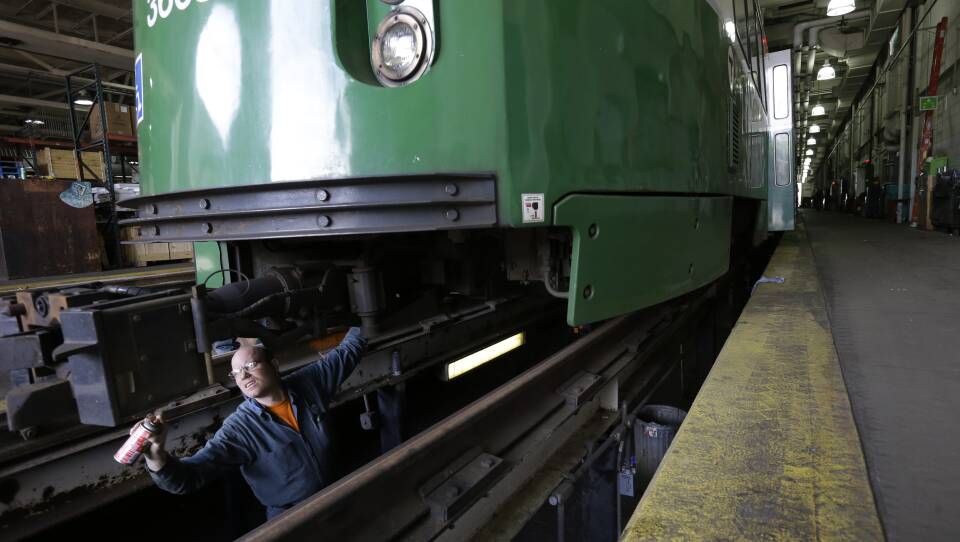The MBTA's projected budget gap is expected to grow to $111 million in fiscal 2019, MBTA General Manager Luis Ramírez told the Fiscal and Management Control Board on Monday, and it's unclear whether fares will be part of the fix.
The projected gap is more than three times as large as the budget problem forecast a year ago. Transit officials could implement cost-savings plans or roll out revenue enhancements in the weeks leading up to April 15 when the T's annual budget is due to completed for the fiscal year that starts July 1.
"Some of these things are actually structural, and they've been in place from before. And what we're going to do in this budget cycle is take a look at all the things we can do to improve not only productivity but also ways to reduce overall spending," Ramírez told reporters. He said, "My goal is to have our spending rate always be below the revenue growth rate."
Gov. Charlie Baker in 2015 restructured oversight of the agency that brings hundreds of thousands of commuters to and from work every weekday, putting it under the oversight of a Fiscal and Management Control Board. After brutal winter weather pushed the MBTA past its breaking point, the governor hoped the management reforms and added spending on infrastructure upgrades would make the MBTA more reliable and efficient.
Lawmakers and Baker still regularly bail the T out of its budget woes. Fare increases could be in play in fiscal 2019.
Over noisy protests, the control board raised fares an average of 9.3 percent in 2016, while also pledging not to raise fares again until January 2019, midway through the fiscal year. Lawmakers later capped fares, limiting each fare to no more than a 7 percent increase every two years.
"I think we are limited in terms of the percent that we can do, and the timing that we can do. But I think as a policy question for the board, we certainly want to discuss what that means," Ramírez said.
In recent years, T officials have touted savings squeezed from union contracts and procurement practices combined with more revenue rolling in from the 2016 fare hikes and new sources like advertising screens. Those decisions helped to stabilize finances, leading to projections of a $30 million gap nearly a year ago, heading into fiscal 2018.
The projected budget gaps fell from $119 million in fiscal 2015 to $86 million in fiscal 2016, $30 million in fiscal 2017, and $30 million again budgeted into fiscal 2018, according to the T. In the 12 months that ended in December, there was a $23 million structural deficit, according to the T.
Michael Abramo, the T's new chief administrator and former CFO, said the T expects to add even more digital advertising screens in the next year, which could enhance revenues.
The fiscal 2019 budget is the first for Ramírez, who took over the T in September.
The network of trolleys, buses, trains, subways, and ferries accounts for roughly 1.2 million trips per weekday, and Democrats have sought to use it as a political cudgel, blaming the governor for transit woes. Three years after the governor put fixing the T near the top of his agenda, transit commuters continue to face delays and crowded platforms.
Some major capital improvements - such as the purchase of brand new Orange and Red line fleets - are already in the works but years away from completion. A variety of factors have contributed to the projected cost increases in fiscal 2019.
Debt service payments will increase by about $49 million in fiscal 2019; the T's pension obligations will inch upwards; and payments to the commuter rail vendor Keolis Commuter Services will climb about $12 million, according to a staff presentation.
After major union contracts kept wages flat in fiscal 2018, some of the biggest bargaining units are due to receive 1.5 percent raises in fiscal 2019 when the combination of higher wages and new hires will add up to about $18 million more spent on salaries in fiscal 2019, according to a presentation by MBTA staff.
One of the key changes that Baker secured for managing the T was a freer hand to outsource work, and over the past couple years the agency has hired vendors to replace in-house operations handling spare parts and cash management.
Contracts with "key customer facing vendors" will increase by $6 million in fiscal 2019, according to the presentation.
"There's been an argument around here that you contract things out, you save money," said Brian Lang, a control board member who is president of the service-workers union UNITE HERE Local 26 and an outsourcing skeptic. Lang said he wanted to learn more about those cost increases.
Paul Brandley, the T's treasurer and acting chief financial officer, highlighted cost increases at the T's ferry contractor.
The governor also wants to delay implementation of a 2015 transportation reform that called for the T to move employees off the debt-funded capital budget and onto the operating budget. That move could be cost-efficient in the long-run but would result in a short-term spike in expenses.
As part of his fiscal 2019 budget proposal, Baker recommended holding back on moving all MBTA employees off the capital budget, writing that using capital funds to pay for employees who work on design and construction is "consistent with government accounting standards and with federal reporting requirements for capital labor."
If the Legislature doesn't include that provision in the final fiscal 2019 state budget, there would be a $27 million "negative impact" on the budget, according to the T. In fiscal 2017, the T transferred 312 employees from the capital to the operating budget, according to the T.
The T also expects to receive an additional $25 million in state funding that lawmakers linked to the sales tax more than a decade ago, and another $4 million in assessments from communities served by the T.

AP
AP



